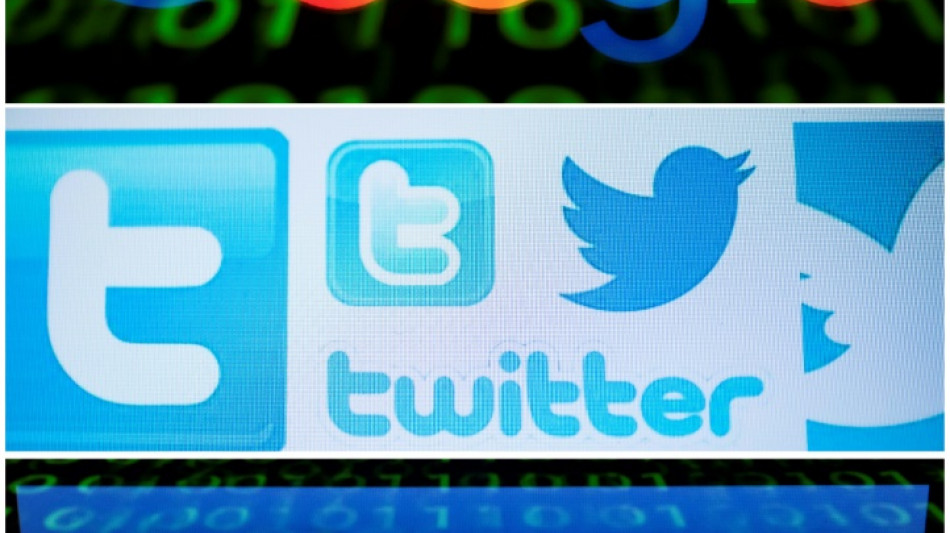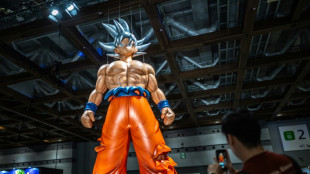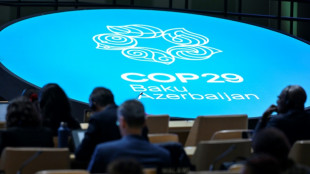
-
 'An inauspicious day': the landmines ruining Myanmar lives
'An inauspicious day': the landmines ruining Myanmar lives
-
UN to vote again on Gaza ceasefire, US plans unclear

-
 Japan's manga powerhouse 'Dragon Ball' turns 40
Japan's manga powerhouse 'Dragon Ball' turns 40
-
Japanese, Koreans bottom of global love life survey

-
 Son blames 'mistakes' after South Korea held by Palestine in qualifier
Son blames 'mistakes' after South Korea held by Palestine in qualifier
-
Japan ramps up tech ambitions with $65 bn for AI, chips

-
 Lights, action, melodrama! Silent films get new reel at London haven
Lights, action, melodrama! Silent films get new reel at London haven
-
Myanmar led world in landmine victims in 2023: monitor

-
 ICC to sentence Timbuktu war criminal
ICC to sentence Timbuktu war criminal
-
Ugandan opposition figure Besigye 'kidnapped', says wife

-
 Australia's Jason Day eyes more major glory after resurgence
Australia's Jason Day eyes more major glory after resurgence
-
Machu Picchu security boosted after visitors spread human ashes

-
 Popovic hails Australia character in 'crazy' World Cup qualifier
Popovic hails Australia character in 'crazy' World Cup qualifier
-
Taliban govt clearing 'un-Islamic' books from Afghanistan shelves

-
 Argentina beat Peru as Uruguay hold Brazil
Argentina beat Peru as Uruguay hold Brazil
-
Asian markets struggle as traders weigh geopolitical tensions

-
 Tatum stars as Celtics end Cavaliers unbeaten start
Tatum stars as Celtics end Cavaliers unbeaten start
-
Hurting India under pressure in blockbuster five-Test Australia series

-
 'They killed her dream': Israel strike leaves woman footballer in coma
'They killed her dream': Israel strike leaves woman footballer in coma
-
Iraq holds its first census in nearly 40 years

-
 Iraqis face tough homecoming a decade after IS rampage
Iraqis face tough homecoming a decade after IS rampage
-
Russian net tightens around last civilians left in eastern Ukraine

-
 Olympic champion Tebogo aims to inspire next generation of African athletes
Olympic champion Tebogo aims to inspire next generation of African athletes
-
Valencia on target as ten-man Ecuador upset Colombia

-
 'Rust' to premiere three years after on-set shooting
'Rust' to premiere three years after on-set shooting
-
Strike at French cognac maker Hennessy over measures in China spat

-
 Xi, Lula meet in Brasilia to 'enhance ties'
Xi, Lula meet in Brasilia to 'enhance ties'
-
SpaceX fails to repeat Starship booster catch, as Trump watches on

-
 'I have left a legacy': Nadal retires from tennis
'I have left a legacy': Nadal retires from tennis
-
US recognizes Venezuela opposition's Gonzalez Urrutia as 'president-elect'

-
 European powers, US seek to censure Iran at UN nuclear watchdog board
European powers, US seek to censure Iran at UN nuclear watchdog board
-
UNAIDS chief says husband, Ugandan opposition figure Besigye, 'kidnapped'

-
 Nadal's sensational career ends as Netherlands defeat Spain in Davis Cup
Nadal's sensational career ends as Netherlands defeat Spain in Davis Cup
-
US announces talks with Israel over civilian casualties in Gaza

-
 SpaceX fails to repeat Starship booster catch, as Trump looks on
SpaceX fails to repeat Starship booster catch, as Trump looks on
-
G20 summit ends with Ukraine blame game

-
 Trump appoints TV celebrity 'Dr. Oz' to key US health post
Trump appoints TV celebrity 'Dr. Oz' to key US health post
-
European stocks fall on Ukraine-Russia fears, US focused on earnings

-
 Last-gasp Szoboszlai penalty rescues Hungary draw with Germany
Last-gasp Szoboszlai penalty rescues Hungary draw with Germany
-
Germany, Netherlands draw as Nations League group stage ends

-
 Hong Kong tycoon Jimmy Lai takes witness stand in collusion trial
Hong Kong tycoon Jimmy Lai takes witness stand in collusion trial
-
Guardiola set to extend stay as Man City boss - reports

-
 Minnows Botswana hold Egypt to qualify with Mozambique, Tanzania
Minnows Botswana hold Egypt to qualify with Mozambique, Tanzania
-
Inter Miami coach Martino leaving club for 'personal reasons' - club source

-
 Chinese man sentenced to 20 months for Falun Gong harassment in US
Chinese man sentenced to 20 months for Falun Gong harassment in US
-
Hong Kong court jails 45 democracy campaigners, drawing condemnation

-
 'I did it for Rafa': Alcaraz after keeping Spain Davis Cup dream alive
'I did it for Rafa': Alcaraz after keeping Spain Davis Cup dream alive
-
Alcaraz keeps Spain and Nadal Davis Cup dream alive

-
 Trump names China hawk Howard Lutnick commerce secretary
Trump names China hawk Howard Lutnick commerce secretary
-
Europe's pivotal role in bid to strike COP29 climate deal


US top court backs Big Tech over terror claims
The US Supreme Court handed a victory to Twitter and Google on Thursday, saying the social media giants could not be held liable by victims of terrorist attacks for posts that endorsed the Islamic State group.
Crucially, the cases that targeted Google-owned YouTube and Twitter were seen as potential challenges to decades-old legal protections for tech companies.
The justices declined to wade into the debate, indicating that the cases fall outside the scope of the law because the platforms did not in any case "aid and abet" IS terror attacks by hosting postings supportive of the extremist group.
A law known as Section 230 gives internet platforms blanket immunity from any legal fallout of content that comes from a third party, even if it is pushed out as a recommendation by the website.
Section 230, which became law in 1996, is credited with allowing the no-holds-barred expansion of the internet but has increasingly been seen as helping cause the harmful effects of social media on society.
Without it, websites would potentially be open to lawsuits for content posted by users, making the free-wheeling discussions seen on social media subject to much stricter moderation.
A bitterly divided US Congress has failed to update the rules, and many US states are passing their own laws to make platforms such as Facebook, Instagram and TikTok more responsible for content.
"Enough is enough... Congress must step in, reform Section 230, and remove platforms' blanket immunity from liability," said influential Democratic Senator Dick Durbin after the ruling.
- 'Decline to address' -
The justices of the Supreme Court largely evaded the question. They said that the allegations against YouTube and Twitter did not amount to a liable infraction and therefore the debate over section 230 was not pertinent.
"We therefore decline to address the application of Section 230 (in a case) that appears to state little, if any, plausible claim for relief," they said.
The justices however gave no indication on how they could potentially address the immunity issue in the future, nor were their stances on the matter made clear at hearings in February.
Google welcomed the result.
"Countless companies, scholars, content creators and civil society organizations who joined with us in this case will be reassured by this result," said Halimah DeLaine Prado, Google’s general counsel.
An association representing US tech companies said the decision was good news.
"The Court correctly recognized the narrow posture of these cases and declined to rewrite a key tenet of US Internet law, preserving free expression online and a thriving digital economy," said Matt Schruers, head of the Computer & Communications Industry Association.
- 'Fight another day' -
The first of the two cases involved a US victim of the 2015 Paris attacks, claimed by the IS group.
The other case was brought by the family of a victim of a 2017 attack by the group on an Istanbul nightclub.
The family alleged that Twitter's failure to take down and stop recommending IS tweets constituted aiding an act of terror.
The Supreme Court declines to hear the vast majority of the cases that come its way, and experts had predicted that by opting to decide on this one justices could be willing to modify the increasingly contested landmark law.
But in the hearings, the justices largely expressed doubts that the case would be fit to begin a debate about reworking Section 230.
W.Morales--AT

